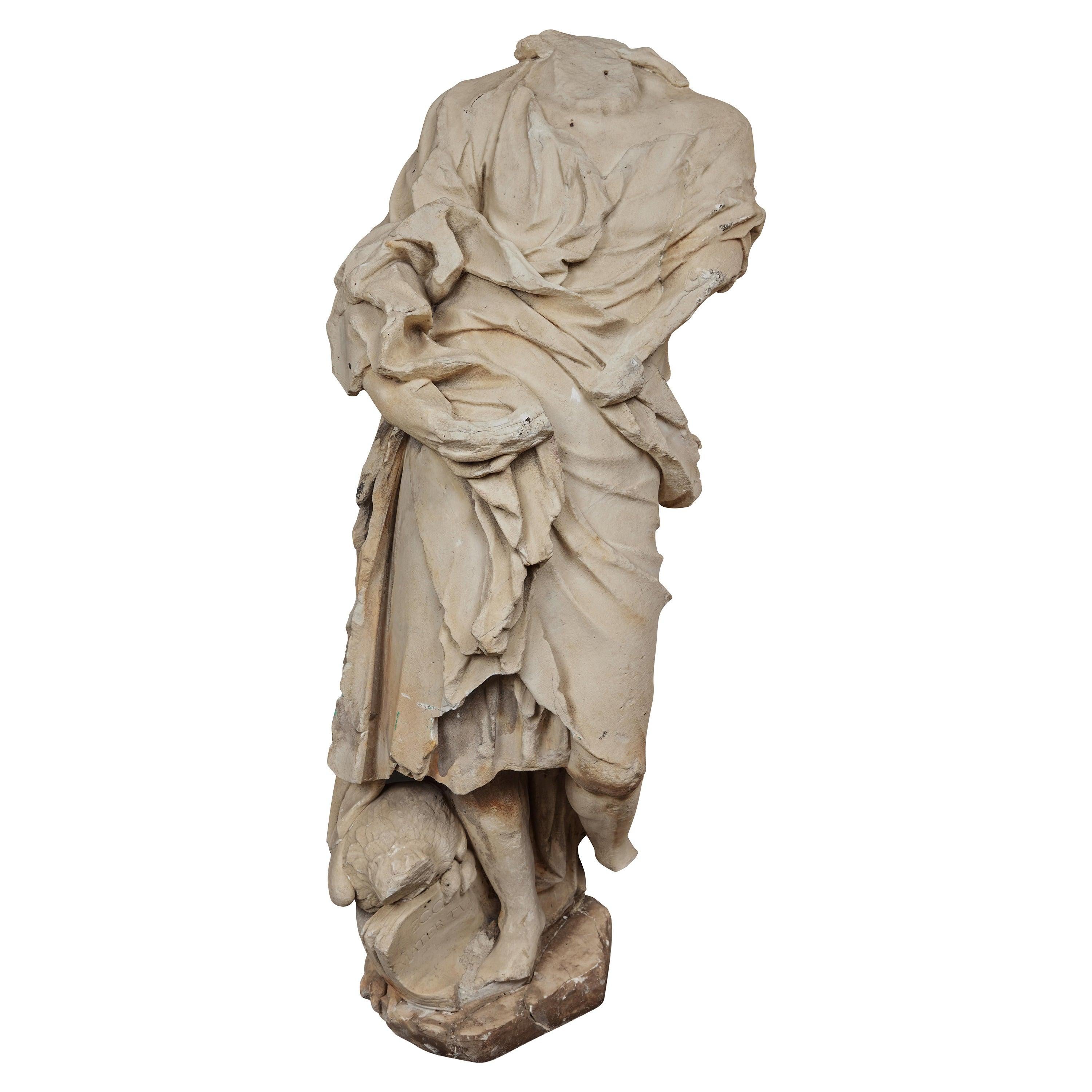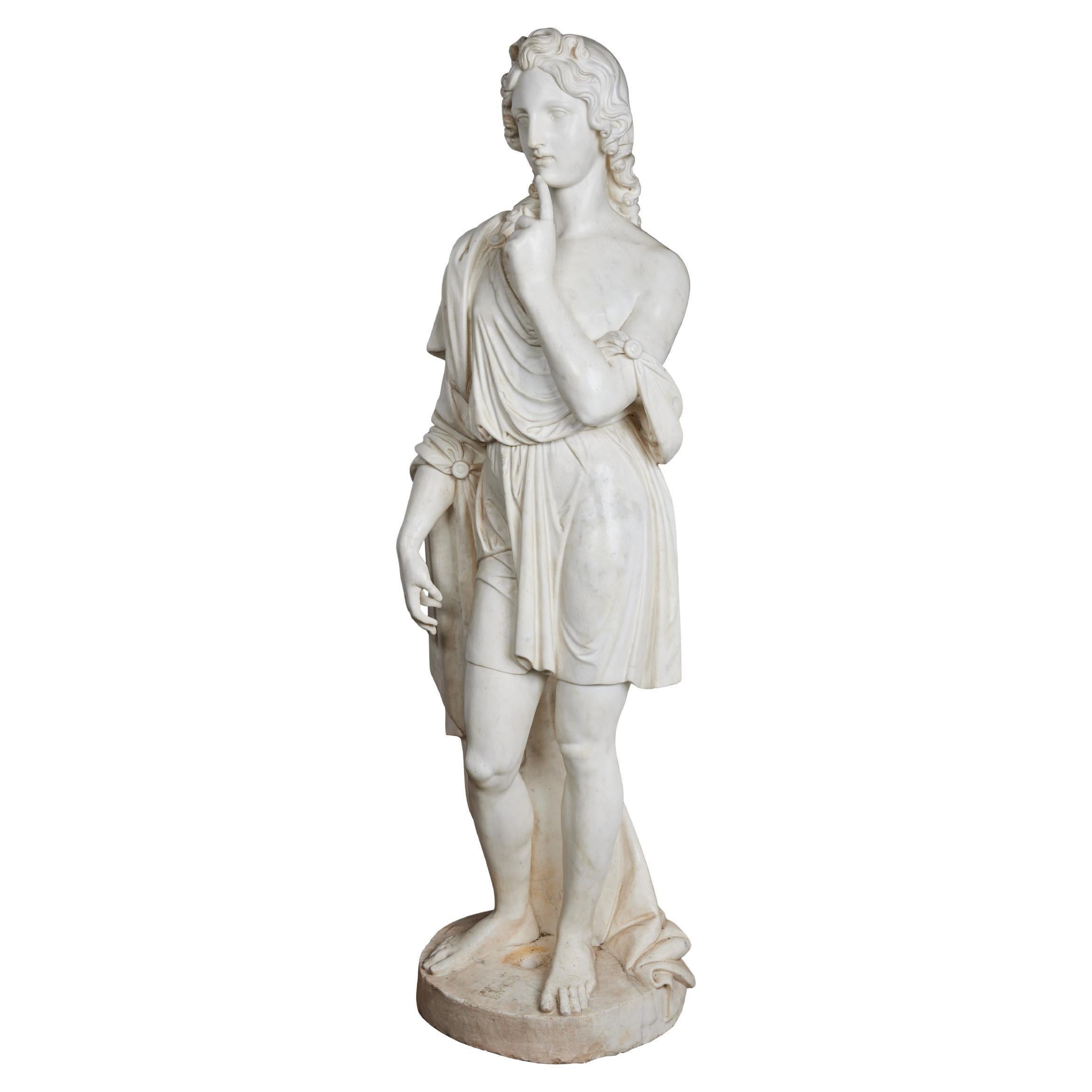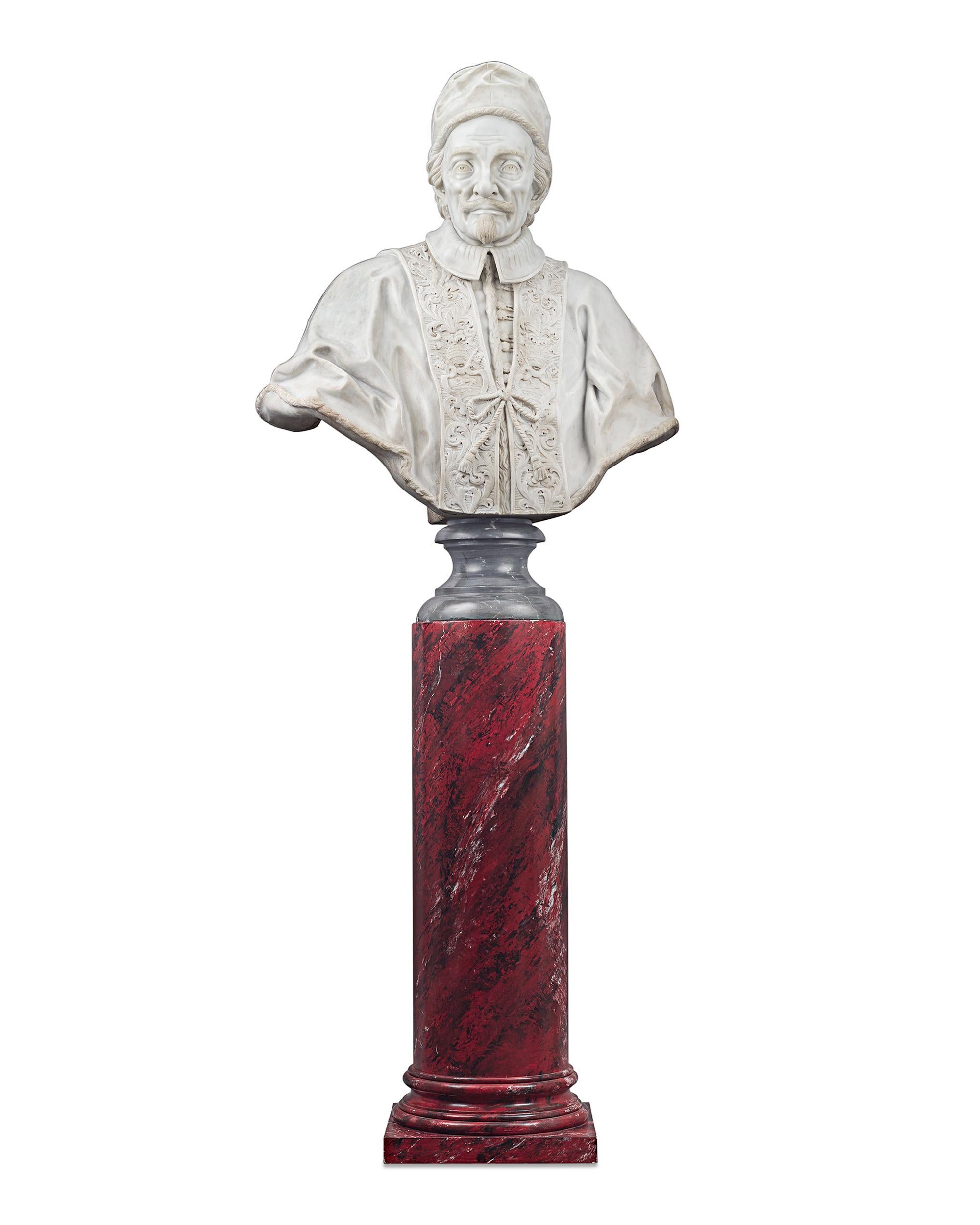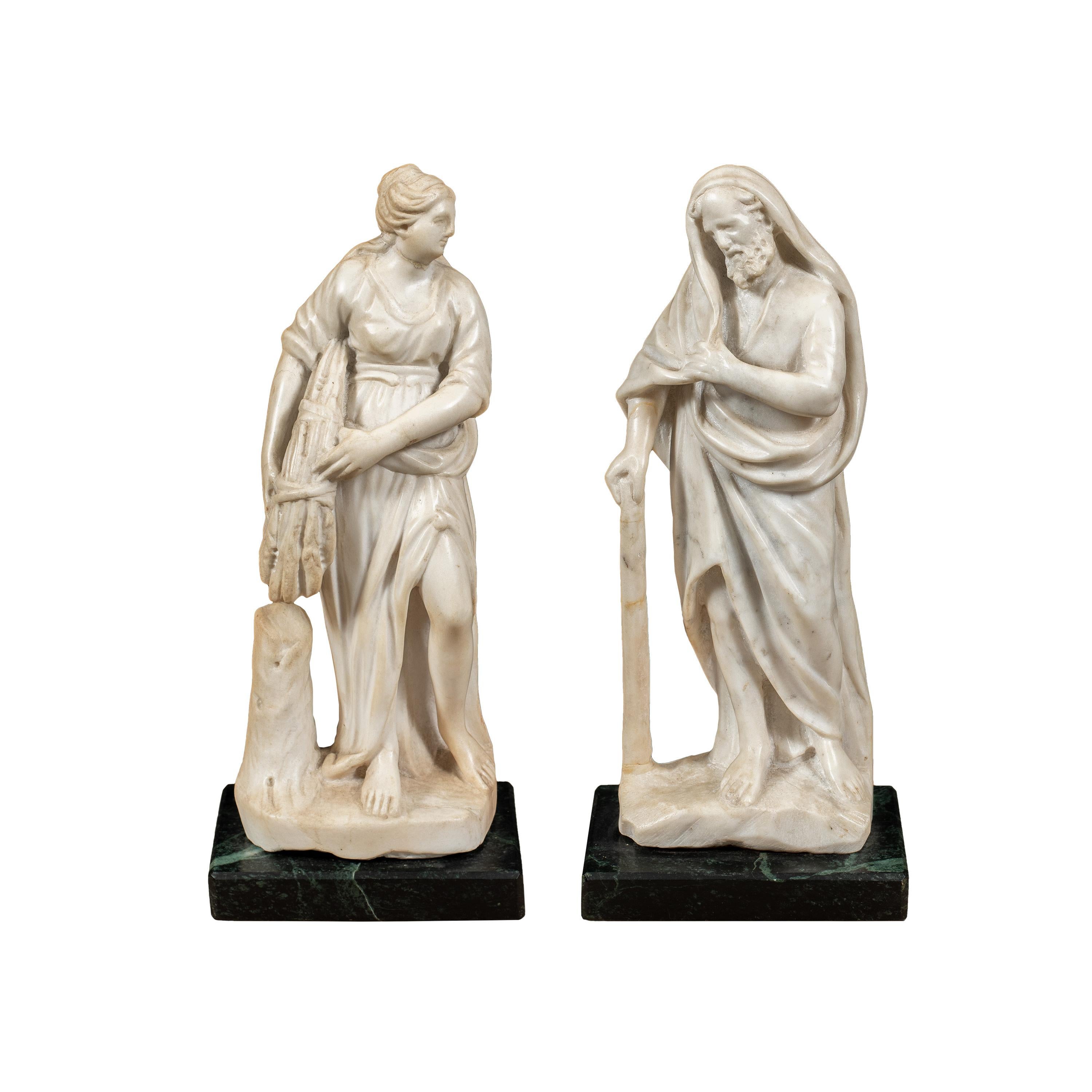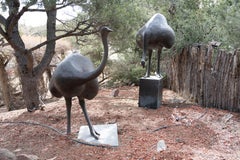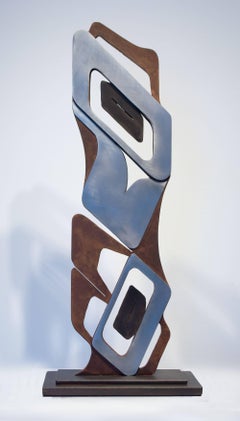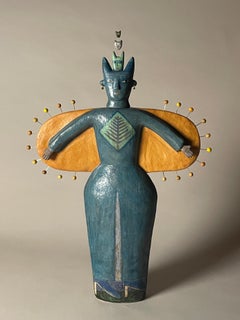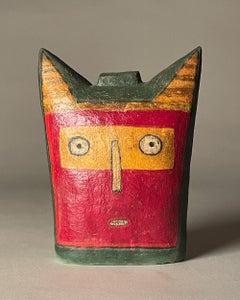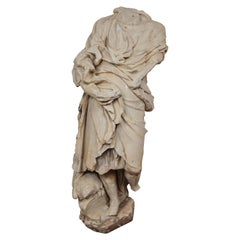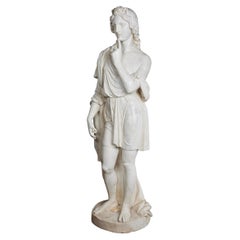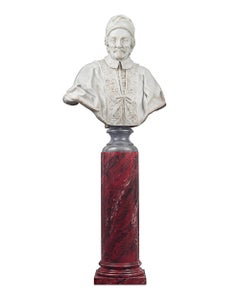Items Similar to Pair of 19th Century Busts by Albert Ernest Carrier-Belleuse
Want more images or videos?
Request additional images or videos from the seller
1 of 17
Albert-Ernest Carrier-BelleusePair of 19th Century Busts by Albert Ernest Carrier-Belleuse1860
1860
About the Item
Signed: A. Carrier-Belluese
Two large bronze matching busts of an unknown male and female
22 x 10 x 11" male
23 x 10 x 9" female
Both show signs of wear with their age but are in fair, if not a bit distressed condition overall
one of the marble bases has a chip, see pics for details
Not sure of exact year of creation, possibly 1860s
French / Victorian era
Albert Ernest Carrier-Belleuse (1824-1887)
Carrier-Belleuse was a student of David d'Angers and briefly at the École des Beaux-Arts. His career is distinguished by his versatility and his work outside France: in England between 1850 and 1855[1] (working for Mintons), and in Brussels around 1871. His name is perhaps best known because Auguste Rodin worked as his assistant between 1864 and 1870. The two travelled to Brussels in 1871,[2] and by some accounts Rodin assisted Carrier-Belleuse's architectural sculpture for the Brussels Stock Exchange.
- Creator:Albert-Ernest Carrier-Belleuse (1824 - 1887, French)
- Creation Year:1860
- Dimensions:Height: 23 in (58.42 cm)Width: 22 in (55.88 cm)Depth: 10 in (25.4 cm)
- Medium:
- Movement & Style:
- Period:
- Condition:
- Gallery Location:Santa Fe, NM
- Reference Number:1stDibs: LU51333397821
Albert-Ernest Carrier-Belleuse
Albert-Ernest Carrier-Belleuse was a French sculptor. Carrier-Belleuse was born on 12th June 1824 at Anizy-le-Château, Aisne, France. He began his training as a goldsmith's apprentice. He was a student of David d'Angers and briefly studied at the École des Beaux-Arts. His career is distinguished by his versatility and his work outside France, in England between 1850–55 and in Brussels around 1871. His name is perhaps best known because Auguste Rodin worked as his assistant between 1864 and 1870. The two traveled to Brussels in 1871 and by some accounts, Rodin assisted Carrier-Belleuse's architectural sculpture for the Brussels Stock Exchange.
About the Seller
4.7
Vetted Professional Seller
Every seller passes strict standards for authenticity and reliability
Established in 1993
1stDibs seller since 2016
120 sales on 1stDibs
- ShippingRetrieving quote...Shipping from: Santa Fe, NM
- Return Policy
Authenticity Guarantee
In the unlikely event there’s an issue with an item’s authenticity, contact us within 1 year for a full refund. DetailsMoney-Back Guarantee
If your item is not as described, is damaged in transit, or does not arrive, contact us within 7 days for a full refund. Details24-Hour Cancellation
You have a 24-hour grace period in which to reconsider your purchase, with no questions asked.Vetted Professional Sellers
Our world-class sellers must adhere to strict standards for service and quality, maintaining the integrity of our listings.Price-Match Guarantee
If you find that a seller listed the same item for a lower price elsewhere, we’ll match it.Trusted Global Delivery
Our best-in-class carrier network provides specialized shipping options worldwide, including custom delivery.More From This Seller
View AllLarge Ostrich Set of four
By Peter Woytuk
Located in Santa Fe, NM
Peter Woytuk, American artist, born 1958
Large Ostrich Set of four
priced as the set
DATE 1999
MEDIUM cast patinated bronze, number 5 in an edition of 8
molds have been destroyed; n...
Category
Late 20th Century American Realist Figurative Sculptures
Materials
Bronze
Salmon and the Raven
By Clayton Peshlakai
Located in Santa Fe, NM
hand fabricated steel edition 2 of 9
Sculpture size 23.5 x 7 x .75"
with the base is 23.5 x 9.5 x 5"
Clayton Peshlakai was born in the small town of Ft. Defiance, Arizona, on the Navajo Indian Reservation. Although he has no formal art education, Clayton’s involvement in art began at an early age when comic books and graphic novels sparked his interest. A combination of fantastic storytelling and exotic art helped him escape the world he lived in and create a world of his own. He first began drawing with pencil, then pen and ink, eventually incorporating watercolor. He constantly experimented with styles and techniques using watercolor and pen and ink—separately and together—never settling on just one.
In his junior high school wood shop Clayton was exposed to drafting. To him technical drawing was a new form of art. It was rooted in discipline and education—two things he needed when there seemed to be no direction in life. His desire to excel in drafting boosted his grades, and Clayton was invited to attend a college prep high school for “gifted” Native Americans. Here he studied architecture, then went on to the local community college to pursue electrical engineering.
While in college Clayton worked in numerous construction fields to support himself, gaining valuable experience that would benefit him later as a professional artist. Inspired by pipeline construction welders and their ability to manipulate and fuse metal, Clayton’s interest shifted from designing to building. Within a year he became a code-certified welder, obtaining the skills necessary to work with an assortment of metals. Over the next eight years he honed his craft in a variety of industrial fields.
Clayton was introduced to sculpture fabrication in the early 1990s. As a project manager for a small metal art fabrication shop, he worked with artists of various backgrounds, including the late Allan Houser, Dan Namingha, and Bill Barrett, to help create their visions in metal. Art fabrication was a refreshing change from the industrial world and reconnected Clayton with his true passion of working with metals.
As a metal fabricator Clayton was satisfied with the challenges presented to him. But when he was contracted as an artist’s assistant for painter William Debilzan...
Category
21st Century and Contemporary Contemporary Figurative Sculptures
Materials
Steel
Spirit of the Night
Located in Santa Fe, NM
Artist Statement
I absolutely love working with clay. Creating forms with a chunk of moist earth is a tangible way to cultivate beauty and delight. Through my work, I hope to touch ...
Category
2010s Folk Art Figurative Sculptures
Materials
Ceramic
Face Jar
Located in Santa Fe, NM
Artist Statement
I absolutely love working with clay. Creating forms with a chunk of moist earth is a tangible way to cultivate beauty and delight. Through my work, I hope to touch ...
Category
2010s Folk Art Figurative Sculptures
Materials
Ceramic
Large Face Jar
Located in Santa Fe, NM
Artist Statement
I absolutely love working with clay. Creating forms with a chunk of moist earth is a tangible way to cultivate beauty and delight. Through my work, I hope to touch ...
Category
2010s Folk Art Figurative Sculptures
Materials
Ceramic
Large Face Jar
Located in Santa Fe, NM
Artist Statement
I absolutely love working with clay. Creating forms with a chunk of moist earth is a tangible way to cultivate beauty and delight. Through my work, I hope to touch ...
Category
2010s Folk Art Figurative Sculptures
Materials
Ceramic
You May Also Like
Renaissance Era Marble Figure Fragment
Located in Los Angeles, CA
An extraordinary 17th century, hand-carved, solid Carrara marble, life sized figure fragment on raised base of the same. The subject is swaddled in a luxurious, gathered robe and tun...
Category
17th Century Baroque Figurative Sculptures
Materials
Marble
Life Size Roman Marble Figure
Located in Los Angeles, CA
A beautifully hand carved, full size Carrara marble figure of a boy. The robe is elegantly draped with clasps.
Category
19th Century Baroque Figurative Sculptures
Materials
Marble
Bust of Pope Innocent XI Odescalchi by Domenico Guidi
Located in New Orleans, LA
This monumental bust is a museum-quality example of Roman Baroque sculpture. Crafted by the legendary Domenico Guidi and carved from Carrara marble, the impressive portrait captures the visage of Pope Innocent XI, Benedetto Odescalchi (1611-1689). It presents a larger-than-life example of Guidi’s remarkable skill as a sculptor, which ultimately made his workshop one of the most important in Rome during his age. Today, his works are rarely found on the market, particularly his extraordinary works in marble.
Pope Innocent XI was born Benedetto Odescalchi into an Italian noble family of prominent bankers. Spending his early years in banking, he eventually turned to the law, earning his doctorate in 1639. His background would serve him well in his service to the papacy, and he became known as a frugal and devout member of the Church. In 1676, he was unanimously elected Pop after the death of Clement X. During his nearly 13-year reign, he instilled his own personal ideals of austerity and frugality onto the Church, with a deep commitment to reform and piety.
He is captured here by Guidi in his traditional Pope’s mozzetta and camauro cap. A wide stole is draped over his shoulders, ornamented by acanthus leaves and the coat of arms of the Odescalchi family. It displays Guidi’s mastery over the chiaroscuro effect, particularly in the high level of contrast in his cheeks and his eyes, which Guidi achieved through various methods of high polish.
A very similar portrait sculpture of Pope Innocent XI by Guidi can be found in the collection of the Royal Castle in Warsaw. The Warsaw bust belongs to a series of portraits of popes which the Odescalchi family commissioned from Domenico Guidi in the 1690s. Compared to that example, the present bust is far more dramatic, with deeper cut lines and a more precise expression. It is likely that the present piece was seen by the Odescalchi family, who ordered a similar one to be made. The piece was almost certainly intended to be displayed in a niche, given its dramatic cutting and its roughly carved back.
Others of Guidi’s busts can be found in important collections throughout Italy, England and the United States, though many of these are lesser bronze repetitions. A bronze bust of the Pope Alexander VIII by Guidi is currently in the collection of the Victoria & Albert Museum (London), while a terracotta version of the same is in the Los Angeles County Museum. A bronze of Pope Alexander VIII can be found in the Princely Collection of Lichtenstein, and his impressive marble papal bust of Clement IX graces the pope’s tomb in Santa Maria Maggiore. The present bust of Pope...
Category
17th Century Baroque Figurative Sculptures
Materials
Marble
Pair of Antique Yellow Marble Profiles Roman Empresses 17th Century
Located in Pistoia, IT
Pair of early 17th-century medallion profiles in antique yellow marble and onyx
Pair of medallions depicting Agrippina and Faustina, Rome, 17th century.
Ra...
Category
Early 17th Century Baroque Figurative Sculptures
Materials
Marble
Pair of early 16th century Baroque marble sculptures - Allegory Summer Winter
Located in Varmo, IT
Pair of white marble sculptures - Allegory of Summer and Winter. Italy, early 17th century.
13 x 10 x h 30 cm including base, 11 x 9 x h 28 cm excluding base.
Entirely in carved wh...
Category
Early 17th Century Baroque Figurative Sculptures
Materials
Marble
The Rape of Sabine Iconic Bronze Sculpture 1930
Located in Rome, IT
Fine Group of Sculptures in Bronze after Jean de Boulogne (Giambologna)
The torturously twisting Rape of the Sabine Women is one of the finest and most technically difficult sculptures in the world. Three intertwined bodies, two men and a woman, spiral upwards as the woman tries to escape the clutches of the younger man standing over the older one. It is an absolute masterpiece by the Flemish sculptor Giambologna.
After the original in Florence’s Loggia dei Lanzi, Piazza della Signoria...
Category
1920s Mannerist Figurative Sculptures
Materials
Bronze
Recently Viewed
View AllMore Ways To Browse
Architecture Sculpture
Stock Exchange
Gold Albert
Antique Exchange
Matching Sculptures
A Carrier Sculpture
Carrier Gold
Large Pair Sculpture Figurative
19th Century Male Bronzes
19th Century Female Bronze Sculpture
Large Figurative Male Sculptures
Large Bronze Bust Sculpture
Bronze Bust Of A Female
Marble David Sculpture
Marble Sculpture Of David
Baroque Marble Sculpture
Bust Of David
A Carrier Bronze
